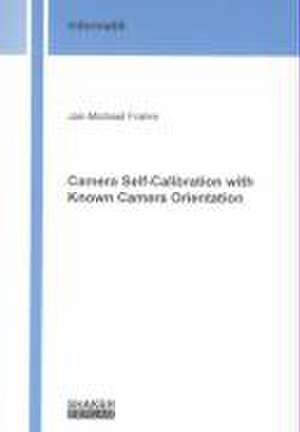Camera Self-Calibration with Known Camera Orientation: BERICHTE AUS DER INFORMATIK
Autor Jan M Frahmen Limba Engleză Paperback – 31 mai 2005
Din seria BERICHTE AUS DER INFORMATIK
- 20%
 Preț: 258.76 lei
Preț: 258.76 lei - 20%
 Preț: 241.95 lei
Preț: 241.95 lei - 20%
 Preț: 232.85 lei
Preț: 232.85 lei - 20%
 Preț: 222.29 lei
Preț: 222.29 lei - 20%
 Preț: 179.32 lei
Preț: 179.32 lei - 20%
 Preț: 209.96 lei
Preț: 209.96 lei - 20%
 Preț: 160.24 lei
Preț: 160.24 lei - 20%
 Preț: 79.80 lei
Preț: 79.80 lei - 20%
 Preț: 239.05 lei
Preț: 239.05 lei - 20%
 Preț: 237.81 lei
Preț: 237.81 lei - 20%
 Preț: 237.42 lei
Preț: 237.42 lei - 20%
 Preț: 252.35 lei
Preț: 252.35 lei - 20%
 Preț: 237.67 lei
Preț: 237.67 lei - 20%
 Preț: 237.37 lei
Preț: 237.37 lei - 20%
 Preț: 225.50 lei
Preț: 225.50 lei - 20%
 Preț: 189.74 lei
Preț: 189.74 lei - 20%
 Preț: 226.32 lei
Preț: 226.32 lei - 20%
 Preț: 187.17 lei
Preț: 187.17 lei - 20%
 Preț: 248.72 lei
Preț: 248.72 lei - 20%
 Preț: 238.34 lei
Preț: 238.34 lei - 20%
 Preț: 243.98 lei
Preț: 243.98 lei - 20%
 Preț: 219.79 lei
Preț: 219.79 lei - 20%
 Preț: 179.45 lei
Preț: 179.45 lei - 20%
 Preț: 233.66 lei
Preț: 233.66 lei - 20%
 Preț: 218.27 lei
Preț: 218.27 lei - 20%
 Preț: 161.88 lei
Preț: 161.88 lei - 20%
 Preț: 231.50 lei
Preț: 231.50 lei - 20%
 Preț: 237.02 lei
Preț: 237.02 lei - 20%
 Preț: 229.12 lei
Preț: 229.12 lei - 20%
 Preț: 215.58 lei
Preț: 215.58 lei - 20%
 Preț: 207.23 lei
Preț: 207.23 lei - 20%
 Preț: 224.57 lei
Preț: 224.57 lei -
 Preț: 269.02 lei
Preț: 269.02 lei - 20%
 Preț: 254.12 lei
Preț: 254.12 lei - 20%
 Preț: 219.92 lei
Preț: 219.92 lei - 20%
 Preț: 246.31 lei
Preț: 246.31 lei - 20%
 Preț: 57.48 lei
Preț: 57.48 lei - 20%
 Preț: 242.42 lei
Preț: 242.42 lei - 20%
 Preț: 246.35 lei
Preț: 246.35 lei - 20%
 Preț: 233.84 lei
Preț: 233.84 lei - 20%
 Preț: 119.13 lei
Preț: 119.13 lei - 20%
 Preț: 221.50 lei
Preț: 221.50 lei - 20%
 Preț: 251.71 lei
Preț: 251.71 lei - 20%
 Preț: 246.66 lei
Preț: 246.66 lei - 20%
 Preț: 160.56 lei
Preț: 160.56 lei - 20%
 Preț: 167.58 lei
Preț: 167.58 lei - 20%
 Preț: 208.30 lei
Preț: 208.30 lei - 20%
 Preț: 221.70 lei
Preț: 221.70 lei - 20%
 Preț: 248.72 lei
Preț: 248.72 lei
Preț: 252.51 lei
Preț vechi: 315.64 lei
-20% Nou
Puncte Express: 379
Preț estimativ în valută:
48.32€ • 50.39$ • 40.16£
48.32€ • 50.39$ • 40.16£
Carte indisponibilă temporar
Doresc să fiu notificat când acest titlu va fi disponibil:
Se trimite...
Preluare comenzi: 021 569.72.76
Specificații
ISBN-13: 9783832241537
ISBN-10: 3832241531
Ilustrații: 50 schwarz-weiße Abbildungen
Dimensiuni: 151 x 211 x 23 mm
Greutate: 0.48 kg
Editura: Shaker Verlag
Seria BERICHTE AUS DER INFORMATIK
ISBN-10: 3832241531
Ilustrații: 50 schwarz-weiße Abbildungen
Dimensiuni: 151 x 211 x 23 mm
Greutate: 0.48 kg
Editura: Shaker Verlag
Seria BERICHTE AUS DER INFORMATIK
